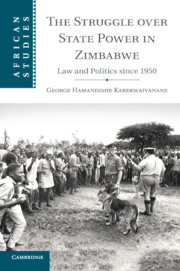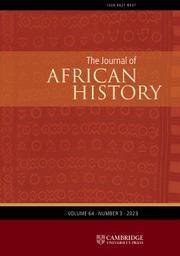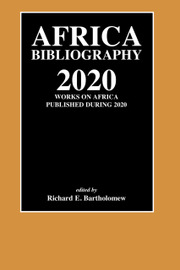The Struggle over State Power in Zimbabwe
The establishment of legal institutions was a key part of the process of state construction in Africa, and these institutions have played a crucial role in the projection of state authority across space. This is especially the case in colonial and postcolonial Zimbabwe. George Karekwaivanane offers a unique long-term study of law and politics in Zimbabwe, which examines how the law was used in the constitution and contestation of state power across the late-colonial and postcolonial periods. Through this, he offers insight on recent debates about judicial independence, adherence to human rights, and the observation of the rule of law in contemporary Zimbabwean politics. The book sheds light on the prominent place that law has assumed in Zimbabwe's recent political struggles for those researching the history of the state and power in Southern Africa. It also carries forward important debates on the role of law in state-making, and will also appeal to those interested in African legal history.
- Offers readers a unique long-term study of law and politics in Zimbabwe, providing an extensive overview in one key text
- By avoiding technical legal concepts, the book offers a multidisciplinary approach to Zimbabwean law and history
- Taking forward important debates in the social and political history of law in Africa, it will appeal to students and scholars interested in historiographical debates in African history
Reviews & endorsements
'This dense and powerful book reminds us that independence and majority rule (and democratization and neoliberalism) are not breaks with the past but the result of the past, and past struggles over rights and with rights - who has them, who can act on them, and who can articulate them.' Luise White, University of Florida
'This volume traces the development of legal institutions in Zimbabwe during the colonial and post-colonial periods, suggesting that such institutions have played a key role in allowing the state to project its authority. Recent debates concerning judicial independence and the rule of law are also discussed.' Jessica Watson, Survival
Product details
March 2020Paperback
9781316640333
292 pages
229 × 151 × 17 mm
0.44kg
14 b/w illus. 3 tables
Available
Table of Contents
- List of figures
- List of tables
- Acknowledgements
- List of abbreviations
- Introduction
- 1. Laying down the law: a historical background, 1890–1950
- 2. Customising justice and constructing subjects: state, 'customary law' and Chiefs' Courts, 1950–1980
- 3. Legislating against dissent: law, race and politics, 1950–1964
- 4. Legality without legitimacy: law and politics during UDI, 1965–1980
- 5. Intermediaries, intellectuals and translators: African lawyers and the struggles in the legal arena, 1950–1980
- 6. Law and transformation: remaking the legal system in postcolonial Zimbabwe, 1980–1990
- 7. Continuity and consolidation: law and politics in Zimbabwe, 1980–1990
- 8. 'The past as prologue': law and politics in Zimbabwe, 1997–2008
- Conclusion
- Bibliography.






